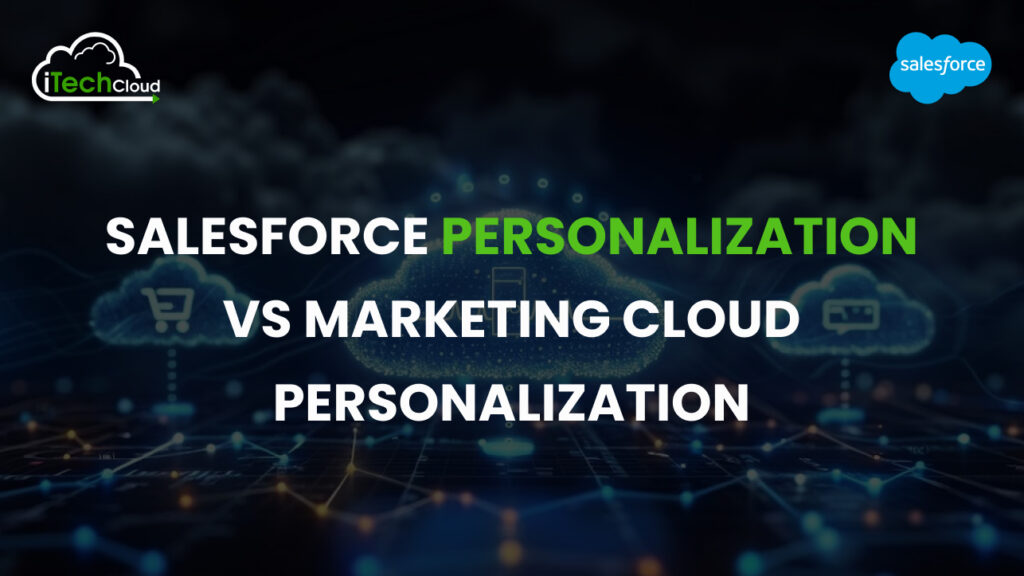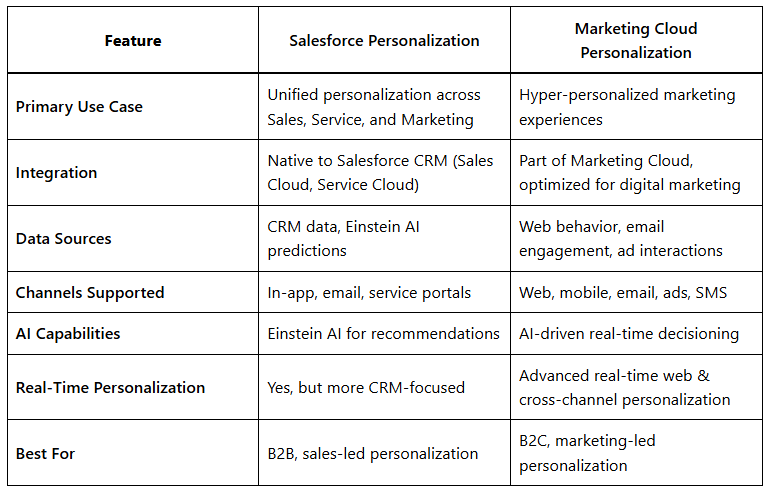Salesforce Personalization vs Marketing Cloud Personalization

Introduction
Personalization has become a cornerstone of modern marketing strategies. Businesses strive to deliver tailored experiences to their customers, and Salesforce offers two powerful solutions to achieve this: Salesforce Personalization and Marketing Cloud Personalization (formerly Interaction Studio).
While both tools aim to enhance customer engagement through personalized experiences, they serve different purposes and cater to distinct use cases. This blog will explore the key differences, features, benefits, and ideal use cases for each solution to help you determine which one best fits your business needs.
Table of Contents
1. Overview of Salesforce Personalization and Marketing Cloud Personalization
What is Salesforce Personalization?
Salesforce Personalization is a feature within the broader Salesforce Customer 360 platform that enables businesses to deliver personalized experiences across sales, service, and marketing touchpoints. It leverages Einstein AI to analyze customer data and provide real-time recommendations, ensuring that every interaction is tailored to the individual.
What is Marketing Cloud Personalization?
Marketing Cloud Personalization (formerly Interaction Studio) is a standalone personalization engine within Salesforce Marketing Cloud. It specializes in real-time, cross-channel personalization for marketing campaigns, websites, and digital experiences. It uses AI-driven insights to optimize customer journeys across email, web, mobile, and advertising channels.
Key Differences Between Salesforce Personalization and Marketing Cloud Personalization
While both tools focus on personalization, they differ in scope, integration, and primary use cases.

3. Deep Dive into Salesforce Personalization
Core Features
1. Einstein-Powered Recommendations
- Uses AI to suggest next-best actions for sales reps, service agents, and marketers.
- Example: Recommending relevant products during a sales call.
2. Unified Customer Profiles
- Aggregates data from Sales Cloud, Service Cloud, and Marketing Cloud for a 360-degree view.
3. In-App Personalization
- Customizes Salesforce Lightning interfaces based on user roles and customer data.
4. Omnichannel Personalization
- Works across email, service portals, and CRM interfaces.
Use Cases
- Sales Teams: Personalized deal recommendations in Salesforce Lightning.
- Service Teams: AI-driven case resolution suggestions.
- Marketing Teams: Tailored email content based on CRM data.
Pros & Cons
✅ Pros:
- Deep CRM integration.
- Works seamlessly across sales, service, and marketing.
- Leverages Einstein AI for intelligent insights.
❌ Cons:
- Less optimized for real-time web personalization.
- Limited to Salesforce-native channels.
4. Deep Dive into Marketing Cloud Personalization
Core Features
1. Real-Time Behavioral Tracking
- Captures customer interactions across web, email, and ads in real time.
2. AI-Driven Decisioning
- Uses machine learning to adjust content dynamically (e.g., personalized web banners).
3. Cross-Channel Orchestration
- Ensures consistent personalization across email, web, mobile, and ads.
4. Audience Segmentation
- Advanced segmentation based on browsing behavior, purchase history, and engagement.
Use Cases
- E-commerce: Personalized product recommendations on a website.
- Retail: Dynamic pricing and promotions based on user behavior.
- Media & Entertainment: Content recommendations (e.g., “Recommended for You”).
Pros & Cons
✅ Pros:
- Best-in-class real-time personalization.
- Optimized for digital marketing channels.
- Strong AI-driven decision-making for web & mobile.
❌ Cons:
- Requires Marketing Cloud integration (not native to CRM).
- More complex setup for non-marketing teams.
5. Which One Should You Choose?
Choose Salesforce Personalization if:
- You need CRM-driven personalization for sales and service teams.
- Your primary focus is Sales Cloud or Service Cloud optimization.
- You want Einstein AI recommendations embedded in Salesforce.
Choose Marketing Cloud Personalization if:
- You need real-time, cross-channel marketing personalization.
- Your focus is B2C e-commerce, web, or ad personalization.
- You want AI-powered dynamic content adjustments.
Conclusion:
In today’s customer-centric landscape, personalization is key to driving engagement and loyalty. Salesforce offers two powerful solutions. Salesforce Personalization and Marketing Cloud Personalization are each designed for different use cases.
Salesforce Personalization is ideal for CRM-driven personalization, enhancing sales, service, and marketing workflows within the Salesforce ecosystem. It leverages Einstein AI to provide intelligent recommendations, making it perfect for B2B organizations that rely on Sales Cloud and Service Cloud.
Marketing Cloud Personalization (formerly Interaction Studio) specializes in real-time, AI-driven marketing personalization across digital channels like web, email, mobile, and ads. It’s best suited for B2C brands that need dynamic, behavior-based content adjustments.

